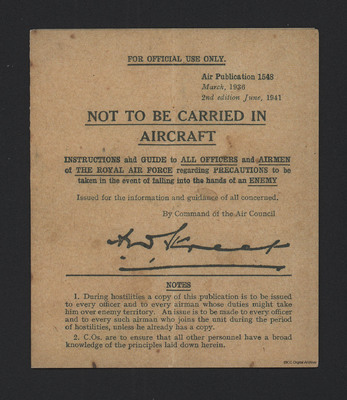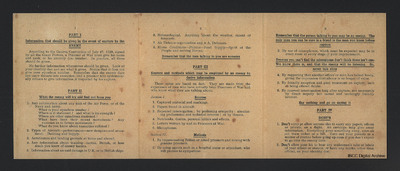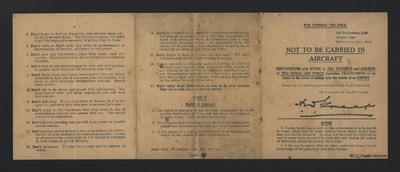Instructions and Guidance to all officers and airmen of the Royal Air Force regarding the precautions to be taken in the event of falling into the hands of the enemy
Title
Instructions and Guidance to all officers and airmen of the Royal Air Force regarding the precautions to be taken in the event of falling into the hands of the enemy
A.P. 1548
Description
Informs what the enemy will try to find out and some of the methods they may use.
Creator
Coverage
Language
Type
Format
Printed form
Publisher
Rights
This content is available under a CC BY-NC 4.0 International license (Creative Commons Attribution-NonCommercial 4.0). It has been published ‘as is’ and may contain inaccuracies or culturally inappropriate references that do not necessarily reflect the official policy or position of the University of Lincoln or the International Bomber Command Centre. For more information, visit https://creativecommons.org/licenses/by-nc/4.0/ and https://ibccdigitalarchive.lincoln.ac.uk/omeka/legal.
Contributor
Identifier
OEllamsG49286-161006-020001, OEllamsG49286-161006-020002, OEllamsG49286-161006-020003,
Transcription
[underlined] FOR OFFICIAL USE ONLY [/UNDERLINED]
Air Publication 1548
[italics] March, [/italics] 1936
[italics] 2nd edition June, [/italics] 1941
[underlined] NOT TO BE CARRIED IN AIRCRAFT [/underlined]
INSTRUCTIONS and GUIDE to [underlined] ALL OFFICERS [/underlined] and [underlined] AIRMEN [/underlined] of [underlined] THE ROYAL AIR FORCE [/underlined] regarding PRECAUTIONS to be taken in the event of falling into the hands of an [underlined] ENEMY [/underlined]
Issued for the information and guidance of all concerned.
By Command of the Air Council
[signature]
[underlined] NOTES [/underlined]
1. During hostilities a copy of this publication is to be issued to every officer and to every airman whose duties might take him over enemy territory. An issue is to be made to every officer and to every such airman who joins the unit during the period of hostilities, unless he already has a copy.
2. C.Os. are to ensure that all other personnel have a broad knowledge of the principles laid down herein.
[page break]
1
[underlined] [bold] PART I
Information that should be given in the event of capture by the ENEMY [/underlined] [/bold]
According to the Geneva Convention of July 27, 1929, signed by all the Great Powers, a Prisoner of War must give his name and rank, or his identity disc number. In practice, all three should be given.
No further information whatsoever should be given. Look at your identity disc and see what it gives. Notice that its does not have your squadron number. Remember that the enemy dare not carry threats into execution, and a prisoner who systematically refuses to give information is respected by his captors.
[underlined] [bold] PART II
WHAT THE ENEMY WILL TRY TO FIND OUT FROM YOU [/underlined] [/bold]
1. Any information about any unit of the Air Force, or of the Navy and Army.
What is your squadron number ?
Where is it stationed ? And what is its strength ?
Where are other squadrons stationed ?
What have been their recent movements ? Any rumours as to future movements ?
What do you know about casualties suffered ?
2. Types of Aircraft – performances – new designs – and armament. Building and Supply.
3. Aerodromes and landing grounds at home and abroad.
4. Any information about training – tactics, British or how much you know about enemy tactics.
5. Information about air raid damage in U.K. or to British ships.
[page break]
2
6. Meteorological. Anything about the weather, recent or forecasts.
7. Air Defence organisation and A.A Defences.
8. Home Conditions – Politics – Food supply – Spirit of the People and serving Forces.
[underlined] [bold] Remember that the men talking to you are enemies
PART III
Sources and methods which may be employed by an enemy to derive information [/underlined] [/bold]
These notes are based on fact. They are made from the experience of men who have actually been Prisoners of War and who know what they are talking about.
[italics] section I. [/italics] [underlined] [bold] Sources [/underlined] [bold]
1. Captured material and markings.
2. Papers found in aircraft.
3. Repeated interrogation ; by professing sympathy ; simulating professional and technical interest ; or by threats.
4. Notebooks, diaries, personal letters and effects.
5. Letters written by and to Prisoners of War.
6. Microphones.
[italics] section II. [/italics] [underlined] [bold] Methods [/underlined] [bold]
1. By impersonating British or Allied prisoners and mixing with genuine prisoners.
2. By using agents such as a hospital nurse or attendant, who will profess to sympathise.
Page break
3
[underlined] [bold] Remember that the person talking to you may be an enemy. The only man you can be sure is a friend is the man you knew before capture [/underlined] [/bold]
3. By use of microphones, which must be expected may be in every room at every stage of your imprisonment.
[underlined] [bold] Because you can’t find the microphone don’t think there isn’t one. We know there is, and that the enemy will be listening. So never talk shop. [/underlined] [/bold]
4. By suggesting that another officer or man has talked freely, giving the impression that silence is no longer of value.
5. By friendly reception and good treatment on capture, such as being offered drinks.
6. By renewed interrogation long after capture, not necessarily by direct enquiry by casual and seemingly friendly interest.
[underlined] [bold] Say nothing and go on saying it
PART IV
DONT’S [/underlined] [/bold]
1. [bold] Don’t [/bold] carry or allow anyone else to carry any papers, officiai (sic) or private, on a flight. An envelope may give away information. Everything gives something away, even an old tram ticket or a bill. Turn out your pockets as a matter of routine before going up even if you don’t expect to go over the enemy lines.
2. [bold] Don’t [/bold] allow your kit to bear any tradesmen’s tabs or labels of your school or station, or have any marks, other than official on your identity disc.
Page break
4
3. [bold] Don’t [/bold] forget to destroy, if possible, your aircraft, maps, etc, by fire if brought down. You have instructions, but don’t forget the imperative necessity of giving effect to them.
4. [bold] Don’t [/bold] while in flight make any notes on performances or shortcomings of aircraft, armament or equipment.
5. [bold] Don’t [/bold] give any information other than name, rank and number. If you stick to this, the interrogator is completely defeated.
6. [bold] Don’t [/bold] refer in any circumstances to your unit and position. A careless word may cost old comrades their lives.
7. [bold] Don’t [/bold] forger there are expert interrogators who will obtain information from you if you enter into conversation with them on even seemingly unimportant subjects. Silence alone is safe.
8. [bold] Don’t [/bold] try to be clever and invent false information. The interrogators have had great experience and will soon find you out.
9. [bold] Don’t [/bold] talk shop. If you have plans to discuss, do it in the open air, and even then take care, even trees have ears.
10. [bold] Don’t [/bold] jump to the conclusion that your room is free of microphones because you cannot find one. The enemy has years of experience.
11. [bold] Don’t [/bold] believe anything you are told from enemy or possible enemy sources.
12. [bold] Don’t [/bold] address letters in such a way as to indicate the whereabouts of your station or any unit of any service. Letters to officers or other ranks of the R.A.F. should be addressed to their homes or c/o Air Ministry.
13. [bold] Don’t [/bold] broadcast. It helps the enemy and is contrary to orders.
Page break
5
14. [bold] Don’t [/bold] be downhearted if captured. Opportunities for escape will present themselves. It is the duty of prisoners to make such attempts which in themselves have a very appreciable nuisance value. In accordance with the custom of the service parole should not be given to an enemy by an officer of the Royal Air Force.
15. [bold] Don’t [/bold] forget to keep your eyes and ears open. We want information useful to others wishing to escape.
16. if you succeed in escaping and arriving in friendly territory don’t discuss your experience with anyone at all, whether in the service or otherwise, and don’t under any circumstances mention the name of any person who may have helped you to escape, until you are interviews by the proper Military Authorities.
17. [bold] Don’t carry these instructions on your or in your aircraft. They are you help you and not the enemy. [/bold]
[bold] [underlined] PART V
Rights of prisoners [/bold] [/underlined]
1. The rights of prisoners of war are fully safeguarded by the Geneva Convention on 1929, and this should be displayed in every Camp. Insist on this being done.
2. There is a neutral Protection Power to whom all serious complaints can be addressed through the Camp Commandant.
3. If you escape to a neutral country, claim your freedom and report to the nearest British representative.
(2266) 72329 Wt. 17814/821 100x 6/41 W.P Ltd
Replica
Air Publication 1548
[italics] March, [/italics] 1936
[italics] 2nd edition June, [/italics] 1941
[underlined] NOT TO BE CARRIED IN AIRCRAFT [/underlined]
INSTRUCTIONS and GUIDE to [underlined] ALL OFFICERS [/underlined] and [underlined] AIRMEN [/underlined] of [underlined] THE ROYAL AIR FORCE [/underlined] regarding PRECAUTIONS to be taken in the event of falling into the hands of an [underlined] ENEMY [/underlined]
Issued for the information and guidance of all concerned.
By Command of the Air Council
[signature]
[underlined] NOTES [/underlined]
1. During hostilities a copy of this publication is to be issued to every officer and to every airman whose duties might take him over enemy territory. An issue is to be made to every officer and to every such airman who joins the unit during the period of hostilities, unless he already has a copy.
2. C.Os. are to ensure that all other personnel have a broad knowledge of the principles laid down herein.
[page break]
1
[underlined] [bold] PART I
Information that should be given in the event of capture by the ENEMY [/underlined] [/bold]
According to the Geneva Convention of July 27, 1929, signed by all the Great Powers, a Prisoner of War must give his name and rank, or his identity disc number. In practice, all three should be given.
No further information whatsoever should be given. Look at your identity disc and see what it gives. Notice that its does not have your squadron number. Remember that the enemy dare not carry threats into execution, and a prisoner who systematically refuses to give information is respected by his captors.
[underlined] [bold] PART II
WHAT THE ENEMY WILL TRY TO FIND OUT FROM YOU [/underlined] [/bold]
1. Any information about any unit of the Air Force, or of the Navy and Army.
What is your squadron number ?
Where is it stationed ? And what is its strength ?
Where are other squadrons stationed ?
What have been their recent movements ? Any rumours as to future movements ?
What do you know about casualties suffered ?
2. Types of Aircraft – performances – new designs – and armament. Building and Supply.
3. Aerodromes and landing grounds at home and abroad.
4. Any information about training – tactics, British or how much you know about enemy tactics.
5. Information about air raid damage in U.K. or to British ships.
[page break]
2
6. Meteorological. Anything about the weather, recent or forecasts.
7. Air Defence organisation and A.A Defences.
8. Home Conditions – Politics – Food supply – Spirit of the People and serving Forces.
[underlined] [bold] Remember that the men talking to you are enemies
PART III
Sources and methods which may be employed by an enemy to derive information [/underlined] [/bold]
These notes are based on fact. They are made from the experience of men who have actually been Prisoners of War and who know what they are talking about.
[italics] section I. [/italics] [underlined] [bold] Sources [/underlined] [bold]
1. Captured material and markings.
2. Papers found in aircraft.
3. Repeated interrogation ; by professing sympathy ; simulating professional and technical interest ; or by threats.
4. Notebooks, diaries, personal letters and effects.
5. Letters written by and to Prisoners of War.
6. Microphones.
[italics] section II. [/italics] [underlined] [bold] Methods [/underlined] [bold]
1. By impersonating British or Allied prisoners and mixing with genuine prisoners.
2. By using agents such as a hospital nurse or attendant, who will profess to sympathise.
Page break
3
[underlined] [bold] Remember that the person talking to you may be an enemy. The only man you can be sure is a friend is the man you knew before capture [/underlined] [/bold]
3. By use of microphones, which must be expected may be in every room at every stage of your imprisonment.
[underlined] [bold] Because you can’t find the microphone don’t think there isn’t one. We know there is, and that the enemy will be listening. So never talk shop. [/underlined] [/bold]
4. By suggesting that another officer or man has talked freely, giving the impression that silence is no longer of value.
5. By friendly reception and good treatment on capture, such as being offered drinks.
6. By renewed interrogation long after capture, not necessarily by direct enquiry by casual and seemingly friendly interest.
[underlined] [bold] Say nothing and go on saying it
PART IV
DONT’S [/underlined] [/bold]
1. [bold] Don’t [/bold] carry or allow anyone else to carry any papers, officiai (sic) or private, on a flight. An envelope may give away information. Everything gives something away, even an old tram ticket or a bill. Turn out your pockets as a matter of routine before going up even if you don’t expect to go over the enemy lines.
2. [bold] Don’t [/bold] allow your kit to bear any tradesmen’s tabs or labels of your school or station, or have any marks, other than official on your identity disc.
Page break
4
3. [bold] Don’t [/bold] forget to destroy, if possible, your aircraft, maps, etc, by fire if brought down. You have instructions, but don’t forget the imperative necessity of giving effect to them.
4. [bold] Don’t [/bold] while in flight make any notes on performances or shortcomings of aircraft, armament or equipment.
5. [bold] Don’t [/bold] give any information other than name, rank and number. If you stick to this, the interrogator is completely defeated.
6. [bold] Don’t [/bold] refer in any circumstances to your unit and position. A careless word may cost old comrades their lives.
7. [bold] Don’t [/bold] forger there are expert interrogators who will obtain information from you if you enter into conversation with them on even seemingly unimportant subjects. Silence alone is safe.
8. [bold] Don’t [/bold] try to be clever and invent false information. The interrogators have had great experience and will soon find you out.
9. [bold] Don’t [/bold] talk shop. If you have plans to discuss, do it in the open air, and even then take care, even trees have ears.
10. [bold] Don’t [/bold] jump to the conclusion that your room is free of microphones because you cannot find one. The enemy has years of experience.
11. [bold] Don’t [/bold] believe anything you are told from enemy or possible enemy sources.
12. [bold] Don’t [/bold] address letters in such a way as to indicate the whereabouts of your station or any unit of any service. Letters to officers or other ranks of the R.A.F. should be addressed to their homes or c/o Air Ministry.
13. [bold] Don’t [/bold] broadcast. It helps the enemy and is contrary to orders.
Page break
5
14. [bold] Don’t [/bold] be downhearted if captured. Opportunities for escape will present themselves. It is the duty of prisoners to make such attempts which in themselves have a very appreciable nuisance value. In accordance with the custom of the service parole should not be given to an enemy by an officer of the Royal Air Force.
15. [bold] Don’t [/bold] forget to keep your eyes and ears open. We want information useful to others wishing to escape.
16. if you succeed in escaping and arriving in friendly territory don’t discuss your experience with anyone at all, whether in the service or otherwise, and don’t under any circumstances mention the name of any person who may have helped you to escape, until you are interviews by the proper Military Authorities.
17. [bold] Don’t carry these instructions on your or in your aircraft. They are you help you and not the enemy. [/bold]
[bold] [underlined] PART V
Rights of prisoners [/bold] [/underlined]
1. The rights of prisoners of war are fully safeguarded by the Geneva Convention on 1929, and this should be displayed in every Camp. Insist on this being done.
2. There is a neutral Protection Power to whom all serious complaints can be addressed through the Camp Commandant.
3. If you escape to a neutral country, claim your freedom and report to the nearest British representative.
(2266) 72329 Wt. 17814/821 100x 6/41 W.P Ltd
Replica
Collection
Citation
Great Britain. Air Ministry, “Instructions and Guidance to all officers and airmen of the Royal Air Force regarding the precautions to be taken in the event of falling into the hands of the enemy,” IBCC Digital Archive, accessed November 14, 2024, https://ibccdigitalarchive.lincoln.ac.uk/omeka/collections/document/23599.
Item Relations
This item has no relations.



